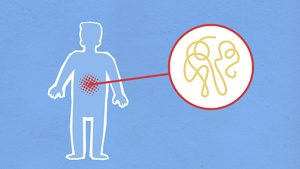 Whether it’s rheumatoid arthritis, heart disease, or sore muscles, inflammation contributes to the problem. One way to reduce inflammation and promote recovery is to change your diet. The food you eat can increase or reduce inflammation and prevent pain. People in Fort Lee, NJ, have learned how adopting a new diet makes a difference in their health. It’s a matter of eating less inflammation-causing food and more food that helps reduce the problem.
Whether it’s rheumatoid arthritis, heart disease, or sore muscles, inflammation contributes to the problem. One way to reduce inflammation and promote recovery is to change your diet. The food you eat can increase or reduce inflammation and prevent pain. People in Fort Lee, NJ, have learned how adopting a new diet makes a difference in their health. It’s a matter of eating less inflammation-causing food and more food that helps reduce the problem.
There are two types of inflammation.
The food you eat affects both types. Acute inflammation is good. The swelling around a wound helps fight infection. It occurs due to disease, injury, or infection. Once the problem is resolved, it dissipates. Chronic inflammation lingers. It can occur due to hypersensitivity, being exposed to chronic irritants, a disorder of your autoimmune system, or experiencing persistent acute inflammation. If you’re older, obese, have an unhealthy diet, smoke, or are under stress, experiencing chronic inflammation is more likely. Acute inflammation is protective, while chronic inflammation can cause a host of diseases, which include asthma, periodontitis, and rheumatoid arthritis.
Start by including foods that fight inflammation.
You may already be eating many of these foods if you have a healthy diet. Leafy greens like spinach, tomatoes, strawberries, cherries, blueberries, and oranges are at the top of the inflammation-fighting food list. They’re high in antioxidants and nutrients that reduce the problem. Snack on tree nuts to fight inflammation. Some of my favorites are walnuts and almonds. The type of oil you use and the type of fat in your diet also make a difference. Foods high in omega-3 fatty acids fight inflammation. They include fatty fish and products from pastured animals.
Add spices to your food to increase anti-inflammatory properties.
Whether you consume chai tea or sprinkle turmeric in your rice with lemon juice for a golden treat, you’re consuming anti-inflammatories. Turmeric is one of the best inflammation fighters. There are small, limited studies that show that turmeric may even help Alzheimer’s and dementia. While the evidence is limited, there’s no harm in adding it to your diet to enhance the flavor of your food. Ginger is another long-used anti-inflammatory. It contains shogaols and gingerols. It can help relieve gas and stomach pain. For centuries, mothers have used ginger ale for stomach aches. Cinnamon, rosemary, cloves, sage, and cayenne pepper are all anti-inflammatories.
- Your fight against inflammation will be easier if you avoid anti-inflammatories. Cut out foods with added sugar and highly processed food. Red meat, a diet high in omega-6 fatty acids, and artificial sweeteners also trigger it.
- Eat food with soluble fiber. Obesity is a leading cause of inflammation and eating food high in fiber helps you lose weight. It also feeds the beneficial bacteria that help lower inflammation in your body.
- Include pineapple in your diet. The bromelain in pineapples not only aids digestion, but also helps reduce inflammation throughout the body. Studies show it benefited people with arthritis.
- Adequate sleep and regular exercise can boost the effects of a healthy diet that cuts inflammation. Include vegetables in a rainbow of colors that represent different phytonutrients. For instance, anthocyanin is blue. Each phytonutrient fights inflammation differently.
For more information, contact us today at VIP Fitness Center
